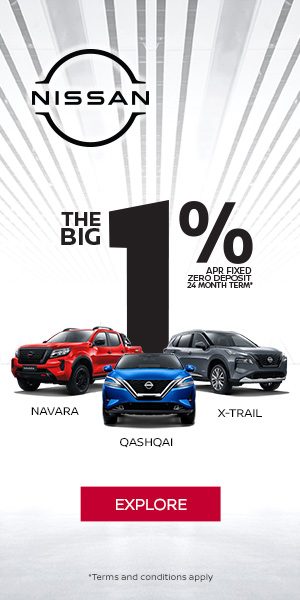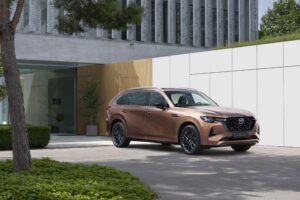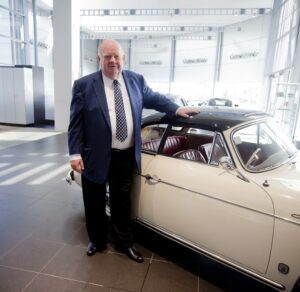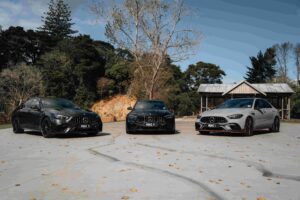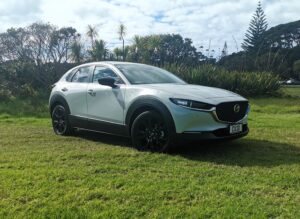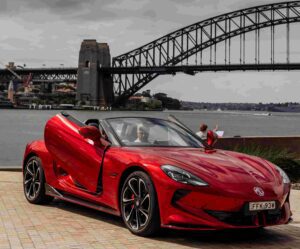Recent reports indicate that our very own ‘clean’ New Zealand country annually spews out more than 81 million tonnes of CO2 gasses into the atmosphere and that 14 million tonnes of that total comes from our roads alone. Yet, by ratifying the Paris Agreement, we as a country have committed to taking action against this sort of climate-changing pollution. We speak with BMW Group New Zealand’s Managing Director Karol Abrasowicz-Madej to gain an insight on what can be done to meet our Agreement obligations and what the BMW Group is doing to help.

The Paris Agreement
For those who don’t know, the Paris Agreement is the global agreement on climate change. Adopted by parties under the United Nations Framework Convention on Climate Change (UNFCCC) on 12 December 2015, It commits all 55 countries (which are responsible for 55 per cent of global emissions) to take action on climate change. It was entered into force on 4 November 2016 and takes effect from right now, 2020.
The purpose of the Paris Agreement is to keep the global average temperature well below 2° C above pre-industrial levels while pursuing efforts to limit the temperature increase to 1.5° C. Also, to strengthen the ability of countries to deal with the impacts of climate change and make sure that financial flows support the development of low-carbon and climate-resilient economies. Basically the agreement provides a framework for the global response to climate change.
New Zealand’s commitment
New Zealand is in the Annex one category. This means our commitment to reduce greenhouse gas emissions, (our Nationally Determined Contribution or NDC), will apply from 2021 and our own NDC target is to reduce greenhouse gas emissions by 30 per cent below 2005 levels by 2030. Make no mistake, this is a big target.
However, our commitment goes further still. A credible long-term greenhouse gas emissions reduction target is an important part of ensuring that New Zealand can make a smooth transition to a low-emissions future. In 2019, NZ’s Climate Change Response (Zero Carbon) Amendment Act set into law a new domestic target of net zero emissions of all greenhouse gases other than biogenic methane by 2050. In addition, a target of 24 – 47 per cent below 2017 biogenic methane emissions by 2050 has been set, including 10 per cent below 2017 biogenic methane emissions by 2030.
This new target brings New Zealand in line with the global ambition set under the Paris Agreement while repealing our former domestic 2050 target that was in place to reduce greenhouse gas emissions to 50 per cent below 1990 levels by 2050.
NZ’s ratification of the agreement also commits us to continue regularly reporting on our emissions and how we’re tracking towards meeting our target. It also compels us to continue providing financial support to assist developing countries’ mitigation and adaptation efforts.
We the people
This commitment from NZ and countries across the globe to ‘save the planet’ is something that, according to a study commissioned by PR firm Porter Novelli and the sustainable business council, everyday Kiwis wholeheartedly support. The study discovered that 87 per cent of NZers believe that New Zealand should aim to be more sustainable and 85 per cent feel that everyone in NZ should have a responsibility to do more around living sustainably. Interestingly, the study also showed that 81 per cent want the government to do more to help NZ become more sustainable.
“NZers do understand what the effects of CO2 mean and they are in favour of companies that act responsibly both socially and environmentally,” says BMW Group New Zealand’s Managing Director Karol Abrasowicz-Madej.
Karol feels that the Kiwi public’s concern and support is not unwarranted.
“If the global temperature gains around 1.5 to two per cent the impact will be deeply felt by all of us,” says Karol. “We are already seeing the effects, with heavy rains, melting glaciers and global sea levels rising. In order for New Zealand to meet the Paris Agreement’s target, the country needs to go from 81 million tonnes of CO2 gasses down to 26 million tonnes per annum, which is some way to go.”

One bite at a time
A drop of 55 million tonnes of gasses per year seems a near impossible mountain to climb but in true Tutu’s ‘how do you eat an elephant’ style, we should approach this target ‘one bite at a time’ and it’s something that Karol concurs with.
What the ‘elephant’ proverb means is that everything in life that seems daunting, overwhelming, but that even the impossible can be accomplished gradually by taking on just a little at a time.
He says, “We can start by working around the around the ‘road transportation’ portion of the issue; this is at least fourteen million tonnes. If we could move a major portion of light vehicles to electric, 80 per cent of road pollution could go away immediately (the 80 per cent is based on NZ providing 80 per cent ‘green’ energy).”
By my calculation, that’s a reduction of 11.2 tonnes! Karol delves even further into the figures.
“Sixty seven per cent of road transport emissions (almost eight million tonnes) is made up of light vehicles and that is where BMW can play a big part.” Karol says.
“BMW understands its responsibility of being a stakeholder in this; we are a premium part of road transportation. Decades ago we started to design cars that were more aerodynamic; we put ‘BMW EfficientDynamics’ technology in place with innovations such as brake energy recuperation and ‘less friction’ tyres very early on in the 2000s. In 2007, we started Project ‘i’ releasing our first electric vehicle – the BMW i3 and then the i8. That gave us a strong foundation and further thought about how we, as an automotive company, move ahead with our own strategy for electromobility.”
Thanks to the learnings derived from Project i, Karol says that between 2006 and 2014 BMW reduced the energy consumption of all its vehicles by around 40 per cent, reduced overall CO2 emissions per vehicle by 71.4 per cent, reduced water consumption by 28.8 per cent and reduced the amount of waste coming out of the vehicle for disposal by around 78.4 per cent (BMW’s vehicles are highly recyclable).
“On top of that, companies like BMW – which are responsible players in the landscape – have started to strategically plan and put into action the essence of the Agreement. Sustainability is a crucial part of our future thinking and developments.
We, global citizens, countries and corporations like ours, have a common goal; we are in the same boat. We are all living on the same planet and we are bonded through the same agreement, so I think the way to move it forward faster than how we are doing at the moment, is together.”

So what’s stopping us all going electric right now, vehicles? Infrastructure?
According to Karol, BMW wants to play a crucial role in the sustainability approach of NZ. The company has seven EV cars on the market right now and has committed to having 25 electrified vehicles in the global market by the end of 2023 – many of which will come to NZ. Those vehicles will undoubtedly help in the reduction of CO2 gasses, but Karol wants us to be clear on what type of EVs they are.
He says: “Our focus isn’t only on fully electric vehicles; it also includes PHEV (Plug-in Hybrids). There may be a misunderstanding in NZ about the technology of PHEVs. Hybrids are internal combustion engine (ICE) with the help of an electric motor and batteries, but these electric components cannot be charged externally.
With a PHEV, you also get an ICE, but they can also operate a short range full-electric mode. In addition, you can charge them any time from your home socket or on public fast chargers.”

Range anxiety?
Of the seven PHEV cars that BMW offers in NZ right now, the ‘electric only’ range offered in these vehicles begins at around 37km.
Karol says “knowing that (according to NZ Government figures) the average commuter drives 22km per day, this gives our customers ample drive range. But even if its 30-40km per day means that in our BMW 330e you can drive to and from work then charge at home that night. So it’s not that we need to have a charging infrastructure to make this happen – we can drive emission free right now.”
Charging times are becoming less of a factor too. The new MINI Electric Hatch can charge up to 80km range in the same 10-12 minutes that a current petrol stop would be and within 36 minutes will charge up to 80 per cent of the vehicle’s full range with a 50kW fast charger.

NZ is perfect for EVs
Karol believes that New Zealand is in a unique position when it comes to renewable energy.
“If 80 per cent of energy in NZ comes from renewable sources we could assume that in an ideal world, we are already helping NZ to reduce its CO2 footprint by far. Not every country has green energy like us, so PHEV vehicles can be considered CO2 free.
The product is there, the infrastructure with ChargeNet NZ already exists, and the customer can charge at home. I would say we need to act collaboratively (individuals, companies and government) into changing the environment around us and capitalise on what is already available. We are not talking about the future; we are talking about now.”
What about the vehicle manufacturers and government?
Karol says, “At BMW Group, we are not only reducing the vehicle emissions but we also look at our entire supply chain to end-of-use phase. By 2030, BMW Group aims to reduce its global CO2 emissions footprint by one third. This is a powerful statement and a serious commitment.”
He adds that introducing incentives have helped make the ownership of EVs more appealing, and suggests NZ could introduce similar incentives. EVs could take the bus lanes or have priority EV parking spots; it doesn’t have to be a fiscal incentive.
“According to our data, around 13 per cent of our vehicles in Europe are electrified but in NZ, around 5 per cent of our total sales are from EVs, so we can do more.”
Karol says that BMW is encouraging the NZ Government to be part of the global initiatives and also believes that being part of the Paris Agreement is testimony to the fact that our Government thinks globally and is acting locally.
“We are delighted to see the government ardently pursuing those goals, and we are happy to be part of this push by making available a range of efficient and sustainable BMW and MINI vehicles.”
However, to speed things up he reiterates that we [NZ] need more incentives.
“Higher incentives for companies that have a sustainable fleet policy may help, for instance. We were part of a group of NZ companies some years ago that signed a memorandum of understanding that wanted up to 30% of their fleet electrified, and that was when we only had the i3 on the market. Now there are even more products available.”
Clean Car – Carrot and stick
As of 2021, NZ’s Clean Car Discount “feebate” will affect anyone buying a new (or newly imported) car with “break-even” emissions (which see neither a rebate nor a fee) of 150-180 gCO₂/km being initially proposed and moving to 105 gCO₂/km by 2025. The most efficient vehicles up to three years old will cost $8000 less, while the least efficient will cost $3000 more. Older used imports (sold in New Zealand for the first time) attract a maximum rebate of $2600 or a $1500 fee.
The idea is to encourage car buyers to choose vehicles that are more efficient and less polluting. The scheme rewards those who choose more efficient models by giving them a rebate on the purchase price – this will be funded by fees added to the price of less efficient vehicles.
It’s a good plan and 105g/km is a strong target. Karol backs the scheme, saying: “We are ready for the challenge, even if 105g/km seems like a difficult target. We have faced stronger targets in Europe and our Euro 6 rated vehicles are already poised to meet very tough 2020 Euro standards.”
Plus he believes that with BMW having seven EV cars available now and 25 by the end of 2023 (including i4, iX and iX3), the brand will be ‘range and production’ ready. He tells me “if the NZ Government introduced a huge EV subsidy, we would speak with our HQ in Germany and we would find a way to get the vehicles here en masse.”
The Power of Choice
BMW has been creating vehicles for more than a century and while for 90 of those years it has offered ICE powertrains, Karol is happy to say that BMW is now the most sustainable company in the automotive business.
“We have the widest range of PHEV and electrified vehicles,”he says. “We now offer the customer the ‘Power of choice’, whereby we provide the same model with different powertains. If we take the X3 as an example, we will offer petrol, diesel, PHEV and in the future, fully electric. Same vehicle, same platform but different powertrains for different customer needs.”
As a global company, Karol says that BMW needs to think globally but at the same time it needs to act locally.
“Thinking global, we need to understand that individual mobility will always be part of our life somehow but it will be different for local people. People who live in Newmarket and who work in Eden Park could drive fully electric vehicle but those who live in Orewa and work in Eden Park would want a PHEV. And then there are places like Cape Reinga where they would likely need a PHEV and also a combustion engine.”
He continues: “If we extrapolate that for the whole globe, we would have different customer needs for those living in the North Africa to those in metropolitan New York. New York will adapt faster to full electric mobility whereas locations with less-dense transport infrastructure will have to use ICE and develop into more sustainable powertrains once infrastructures are built.”
With this ‘Power of Choice’ principle in mind, BMW Group NZ is currently working towards price parity. For example, the 330i M-Sport is $91K, while the 330e PHEV is $93K – just a $2K difference. Same goes for its most popular vehicle, the X5. The X5 45e, which already offers up to 80km ‘EV only’ range, costs $158k, while an equivalent X5 M40i is $150k. And as Karol points out: ‘80km is more than one day’s drive’.

Future of EVs – Bland and unexciting vehicles
In a public statement BMW Group Global has announced that even though we are in the middle of a global pandemic it is still planning to invest 30 billion Euro into R&D. Karol reiterates that part of this will go to the electrification of its fleet. He also understands that, particularly in New Zealand, performance is at the forefront of many BMW customers’ minds.
He says, “Performance doesn’t always lie in combustion engines; whatever we do in the design and production of a vehicle is all about keeping to an absolute BMW DNA. The MINI Electric Hatch is a prime example. MINI is known for rapid acceleration and a go-kart feeling and both those aspects are in the EV version. So for us, those two parts come together; the electric and the vehicle performance is one and the same. Sheer driving pleasure will always remain a core motivation in vehicle development no matter what the powertrain is.
“We have also started a collaboration with (Oscar-winning composer) Hans Zimmer, who has developed a specific sound for our electric vehicles that adds to the feeling of performance. Technology can help too; there is already a technology that recognises when a vehicle is near a green zone and will automatically change the powertrain from ICE to EV only. I am looking forward to putting the latest and the best of what we offer into our vehicles.”
Lessons from COVID
Karol notes that COVID – health and economic impacts notwithstanding – has caused both a reality check and a reset for society and how we collectively approach commuting and working.
“There are more people working from home now, I’d say that Auckland traffic is not as congested as it was before COVID came. It has taught us that even in the polluted centres of the globe, the air can be cleaner if we reduce exhaust gases.
“It also showed us that when faced with a crisis, we are capable of taking advantage of our intellect and acting to make things better. It showed us that the environment is a scarce resource and that we have to take care of it. But if we want to preserve the beautiful landscapes of NZ we still have some homework to do.”
Karol says that it’s important to get the sustainability point across when living in such a beautiful country as NZ, and that we need to take responsibility for our own actions. He also believes that there has to be a justification to why BMW specifically needs to tune in and focus on sustainability.
“Premium doesn’t come without responsibility. The customer needs to know what we do more than the others in this area. If we as a company globally sell more than two million vehicles each year, we have a responsibility to keep promises with two million customers who are willing to extend the partnership/relationship with us for their next vehicle. We must provide a sustainable business and that means investment into the future and protection of our planet’s natural resources.”

Taking it personally
Being a family man and father of three, Karol takes the EV journey seriously.
“I like to take the advantage of the opportunities given to me by the global company. It’s my personal responsibility as Managing Director of BMW Group New Zealand to motivate customers and the public to do what’s good for us, what’s good for the environment and what is sustainable.
“We are all aware that electromobility is the next step for any manufacturer and that other alternative powertrains like hydrogen will arrive and be more prominent down the track. There is already a timeline on the life of the combustion engine depending on where you live, and if we all want to be acting responsibly we need to have the courage enough to make the switch.
“Now is not the time that we need to produce the car or develop the car; it already exists. We know the target, we know when it needs to be met and we know what the best solution is. We only need to come up with the understanding of what we need to do. We must all work on motivating the public to take up the deployment of the measure.”
He finishes the conversation by saying “The opportunity is there, the product is there, we are in a good position; we want to encourage anything that moves towards this goal of New Zealand ratifying the Paris agreement.

“We’re on a journey to save the planet for future generations whether or not the actions we commit to now have done enough will be justified or viewed by our future generations.”

